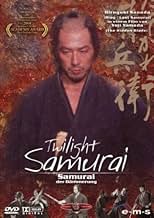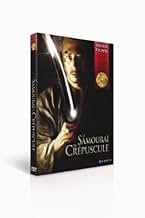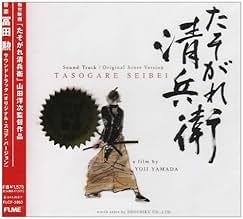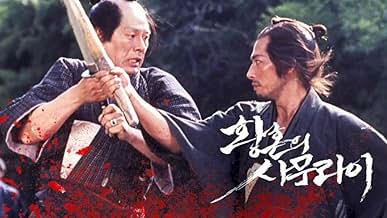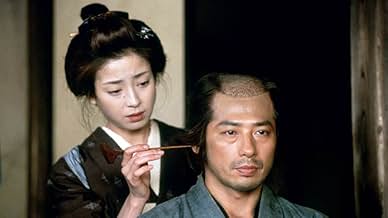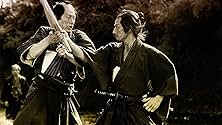A medida que la era del Japón feudal llega a su fin, a un samurái viudo le cuesta conciliar su vida con las lealtades del clan, 2 hijas pequeñas, una madre anciana y la repentina reaparición... Leer todoA medida que la era del Japón feudal llega a su fin, a un samurái viudo le cuesta conciliar su vida con las lealtades del clan, 2 hijas pequeñas, una madre anciana y la repentina reaparición de su novia de la infancia.A medida que la era del Japón feudal llega a su fin, a un samurái viudo le cuesta conciliar su vida con las lealtades del clan, 2 hijas pequeñas, una madre anciana y la repentina reaparición de su novia de la infancia.
- Dirección
- Guionistas
- Elenco
- Nominado a 1 premio Óscar
- 38 premios ganados y 9 nominaciones en total
- Dirección
- Guionistas
- Todo el elenco y el equipo
- Producción, taquilla y más en IMDbPro
Opiniones destacadas
'Twilight Samurai' is a very sweet film. Sorry, those words, sweet and samurai, may not be used together too much but believe it! With luck, 'The Last Samurai' was just that for Hollywood but please Jollywood bring on more of these.
'Tasogare Seibei' is a story about a low-level Samurai family headed by a widower raising two daughters and his mother who's lapsing into senility. What little action in this film shows how far Seibei (Hiroyuki Sanada) has drifted from his professional prowess. He earns his keep as a scribe and an insect trap maker. When he is called on to defend the honor of his clan, his skill is resurrected although his heart is not in it.
Beautifully filmed and dramatically staged, 'Twilight Samurai' will amuse, dazzle and delight you. Told from the perspective of his daughter reflecting on her life with father, this sentimental tale has the feel of allegory and even novices to this genre will enjoy it. My only criticism is the abrupt ending without a clear resolution. And my lack of Japanese language skills distracted me from this well-acted, set and costumed film.
Just another reason to learn the language.
As in much of the cross-fertilization of samurai movies and Westerns such that one can easily imagine a Westernized version, the opening situation recalls "Unforgiven," where a retired gunfighter just wants to be left alone to farm and raise his children and tries to resist pressures to stop putting his fighting skills under a literal grubby basket.
Hiroyuki Sanada gives a superbly nuanced performance as a rebel against the expectations of being the lowest of a high class in a rigidly caste society by embracing the sarcastic titular sobriquet. He is painfully reluctant that he is ever so circuitously revealed to be much more. World weary yet still proud, he gropes for words to explain to his shocked patriarch why he, as an indebted widower, prefers to come home straight from work to see his daughters grow up day by day than follow the family's dictates and anguishes to his best friend about his marriage prospects.
Gradually, surprising people around him are revealed to be as equally complex and frustrated with the roles their society insistently demands even as small step by suffocating step political and social webs inexorably ensnare them tighter and tighter. The flashes of their assertions of their individuality in unexpected moments make for quiet, gripping moments of tension and relief. As his returning childhood friend, Rie Miyazawa has a beautiful, spirited feminity that makes Sanada seem even more of a macho hunk in contrast.
A kind of Jane Austen action flick, it is the kind of movie where antagonists' stares make you hold your breath in suspense and the touch of a hand brings forth your tears.
The translator made a policy decision of just transliterating many traditional Japanese terms, from "sensei" to various styles of sword-fighting, etc. rather than try to find English equivalents. While their meaning can be pretty much inferred from context, it did help that post "Kill Bill" I've been making up for a benighted education that lacked samurai movies and Japanese history.
I found the voice-over narration by the younger daughter a bit schmaltzy and unnecessary. The closing song seemed jarringly period-inappropriate; if it wasn't a Japanese cover of Bob Dylan's "To Make You Feel My Love" then it was a real close imitation with the only clue in English that it was used with permission of EMI.
This is the first of novel adapter/director Yoji Yamada's 77 films that I've seen and I certainly now want to see more.
I've never been much of a fan of samurai movies, or any other kind of movies that glorify the facile wholesale slaughter of other human beings. So this movie was a real breath of fresh air in how it showed the real place that such samurai fighting occupied in that bygone era in Japan.
But the real star of this film is Seibei himself, his daughters, and his love, Tomoe. And their story is so real, so believable, so moving, it was just incredible.
It's a real shame that this title does not seem to be available on video or DVD in the US. This is one title I'd really like to add to my library.
The crux of the film is the relationship between personal honor and social honor. Iguchi is indeed a most honorable man. He truly loves his children and his senile mother, and sacrifices his dignity and station to care for them. He works from dawn to dusk, attending his duties with the court by day and working on his farm by night, somehow finding time to also sell handmade insect/bird cages just to help his family get by. He does all this even though it soon becomes apparent that he has no equal as a swordsman, and in that right alone deserves the respect of those who deride him. We come to understand that selfless sacrifice is the single greatest act of honor, especially when one can still consider himself a blessed man. However, the personal honor that Iguchi wields even more skillfully than his sword becomes at odds with the social honor that his status as a samurai calls for. This conundrum is the heart of almost every scene in the film, and reaches its peak as the story moves toward its climax. Though Iguchi tells his best friend that he would gladly surrender his status as a samurai to become a simple farmer, he finds himself unable to resist his call to duty under the code of the samurai. He knows that to be honorable in his duty as a samurai, he must compromise his honor as a man. How can he kill a man to fulfill the unjust motives of his clan, especially when the man he is fighting is so much like himself?
The direction of the film is beautifully impressionist. Yamada crafts pictures of everyday life which gives us an inherent understanding of the life of Iguchi. In one scene, he sits dejectedly on his doorstep after coming home in the rain, lamenting the holes in his socks while his squire stands outside in the downpour. In another, he quietly applies his perfectionism to the construction of his cages in his dark and dirty living room while his family sleeps. In yet another, he shares a meal with his family as they laugh and enjoy each other's company. Yamada's eye for imagery, in combination with his patient and subtle storytelling, are reminiscent of great impressionist directors such as Ozu, Tarkovsky, and Malick. There are many other memorable images in this film, many of which depict the duality of nature. In one scene we see soldiers learning to fire rifles under the spring buds of a lotus tree. In another we see men fishing along a sapphire blue river, with golden fields behind them and a stunning, snow-capped Mount Fuji on the horizon-- and the bodies of starved peasant children floating down the river.
This is a great film. See it.
¿Sabías que…?
- TriviaOfficial submission of Japan for the 'Best Foreign Language Film' category of the 76th Academy Awards in 2004.
- ErroresWhile Seibei fighting with Toyotaro, Toyotaro katana fell on the ground, right beside Seibei. Toyotaro fell towards river and Seibei make step forward towards Toyotaro, so the katana clearly should stay behind Seibei, beyond possibility to reach by Toyotaro. But from different camera can be seen that katana lay between both of them, 2 meters ahead of Seibei. It's most likely intentional arrangement by director, otherwise Toyotaro wouldn't be able to made his last attempt to grab katana.
- Citas
Seibei Iguchi: I am ashamed to say that over many years of hardship with two daughters, a sick wife and an aged mother, I have lost the desire to wield a sword. A serious fight, the killing of a man, requires animal ferocity and calm disregard for one's own life. I have neither of those within me now. Perhaps in a month... alone with the beasts in the hills I could get them back. But tomorrow, I am afraid, is completely impossible.
- ConexionesFeatured in The 76th Annual Academy Awards (2004)
- Bandas sonorasKimerareta Rhythm
Performed by Yosui Inoue
Selecciones populares
- How long is The Twilight Samurai?Con tecnología de Alexa
Detalles
- Fecha de lanzamiento
- País de origen
- Sitios oficiales
- Idioma
- También se conoce como
- The Twilight Samurai
- Locaciones de filmación
- Productoras
- Ver más créditos de la compañía en IMDbPro
Taquilla
- Presupuesto
- USD 5,000,000 (estimado)
- Total en EE. UU. y Canadá
- USD 559,765
- Fin de semana de estreno en EE. UU. y Canadá
- USD 8,573
- 25 abr 2004
- Total a nivel mundial
- USD 7,372,769
- Tiempo de ejecución2 horas 9 minutos
- Color
- Mezcla de sonido
- Relación de aspecto
- 1.85 : 1
Contribuir a esta página



